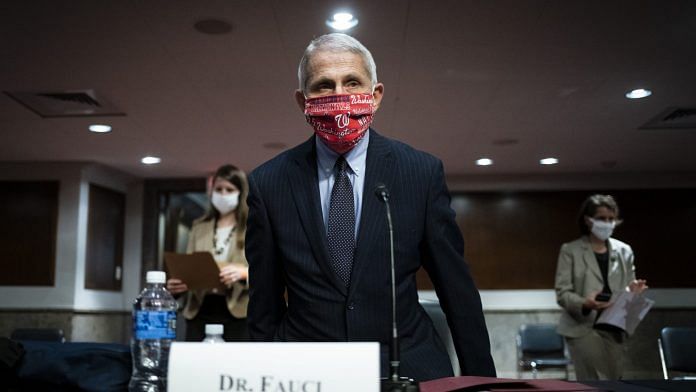New Delhi: Dr Anthony Fauci, one of the world’s top immunology experts and a Covid adviser to the Donald Trump administration, said Wednesday the novel coronavirus pandemic is a “perfect storm” whose end is “nowhere in sight”.
Addressing a webinar organised by the TB Alliance, a US-based non-profit dedicated to research on tuberculosis drugs, Fauci described Covid-19 as the “worst nightmare” of an infectious disease expert or a public health professional.
“We are not at the end of the game, I am not even sure we are halfway through. We are not winning the game, not leading. With 600,000 deaths, it is threatening to overtake TB. It is a perfect storm,” he said at the “Fighting Pandemics | 2020 and Beyond” webinar.
“This virus has everything — it is a new virus, it jumps species, has a respiratory base, is spectacularly effective in spreading from human to human, is deadly to the elderly and people with comorbidities. We are living through a historic pandemic situation with no end in sight,” added Fauci, who serves as director of the US government’s National Institute of Allergy and Infectious Diseases.
He said the disease may be brought under control this year or 2021, but the virus is unlikely to disappear or be eliminated.
Speaking at the same webinar, World Health Organization (WHO) chief scientist Dr Soumya Swaminathan expressed apprehensions that the pandemic may cause other diseases to “go up”.
“Models suggest diseases like HIV, TB and malaria could all go up due to the challenge the health systems are facing… We are extremely worried about the effect of the pandemic in low- and middle-income countries where measures such as lockdowns have caused loss of livelihood and estimates suggest poverty, undernutrition all may go up this year and there will be a setback in the SDG (UN’s sustainable development goals),” she said.
Also Read: As his approval ratings wane, Trump has found a new scapegoat in Dr. Anthony Fauci
‘A broad range’
Answering a question from The Wall Street Journal writer Betsy McKay, who was moderating the session, Fauci expressed hope that, “this year or next year”, the world will be in a position to control the pandemic. However, he said there is little chance of the virus being eradicated, or disappearing on its own like the SARS pathogen — also a coronavirus — responsible for the 2002-03 outbreak.
“With a vaccine, public health measures and herd immunity, there may be very good control, although it is unlikely we can bring it down to the level of a common cold or flu,” he added.
“I have never seen an infection where you have such a broad range. Twenty to 49 per cent of people have no symptoms, some are mildly ill for a fortnight and then have post-viral syndrome, still others need hospitalisation, oxygen support, ICU care, and even die,” he said.
“That is why I don’t see it coming down to a level where everybody just escapes with a sniffle as happens with common flu.”
‘WHO will aim for equitable distribution of vaccines’
Even though there are several vaccine candidates in various phases of clinical trials, with some like the one developed by the Jenner Institute at Oxford University in phase III, there are better chances of a treatment coming up sooner than a vaccine, Dr Fauci said.
As work on the vaccine progresses, Dr Swaminathan said, the WHO is keen to avoid a situation like in 2009, when rich countries cornered the bulk of the vaccine doses after the H1N1 pandemic. “We are doing everything possible to avoid that and to ensure an affordable and equitable distribution of vaccines,” she said.
She lauded the “environment of tremendous scientific collaboration” in the wake of the pandemic that has seen countries and institutions willing to share data, and said she hopes it will eventually extend to other diseases too.
Answering a question about the effect of the US’ withdrawal from the WHO, she said: “We are worried programmes like polio, immunisation, and those to combat neglected tropical diseases such as TB will be impacted. We are especially worried about the polio programme.”
Dr Fauci echoed the concerns, saying it would have very serious implications, and adding that he hopes it works out soon.
Also Read: Covid vaccine could come in a year, but life-as-usual years away, says WHO chief scientist




Scientists are afraid of huge loses for the vaccine production .if the virus disappear on its own clinical trials will go on just a name sake